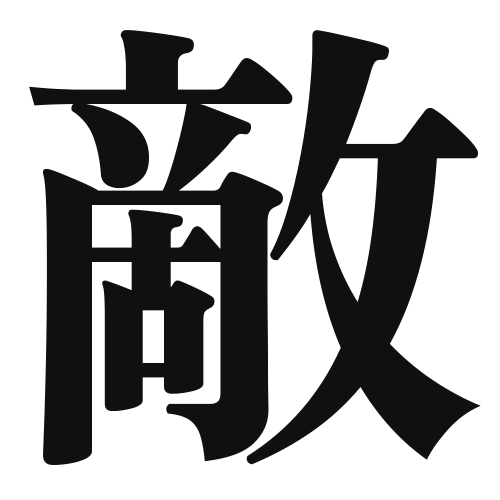1. Overview of Meaning
The kanji “敵” (teki) means “enemy” or “opponent.” It refers to someone or something that is in opposition or conflict with another party.
2. Formation and Radicals
The kanji “敵” is a compound character (会意文字) that combines two elements: the radical “戈” (which represents a weapon) and “可” (which can imply permission or capability). Together, they convey the idea of an adversary that poses a threat.
The radical “戈” is associated with weapons and conflict, reinforcing the meaning of “enemy.”
3. Examples of Usage
Common words and phrases that include “敵” are:
- 敵国 (tekikoku) – enemy country
- 敵対 (tekitai) – hostility or opposition
Example sentences in daily conversation:
- 彼は私の敵です。 (Kare wa watashi no teki desu.) – He is my enemy.
- 敵を倒すために戦う。 (Teki o taosu tame ni tatakau.) – I fight to defeat the enemy.
4. Synonyms and Antonyms
Similar kanji with related meanings include:
- ライバル (raibaru) – rival, which implies competition but not necessarily enmity.
Antonyms include:
- 味方 (mikata) – ally or friend, indicating support rather than opposition.
5. Cultural and Historical Background
The concept of “敵” is deeply rooted in Japanese culture, often associated with themes of conflict and rivalry in literature and history. It appears in various proverbs and idiomatic expressions, such as:
- 敵を知り、己を知れば、百戦危うからず (Teki o shiri, onore o shirubake, hyakusen ayaukarazu) – If you know the enemy and know yourself, you need not fear the result of a hundred battles.
This proverb emphasizes the importance of understanding both your adversaries and yourself in overcoming challenges.
